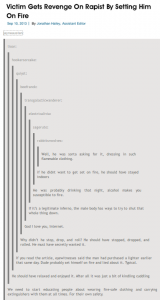So we’ve all heard about the #GoogleManifesto at this point and I have zero interest in engaging with it. I do have an interest in engaging with some of the responses, and Yonatan Zunger’s much-shared Medium piece is at the top of my list.
Zunger makes three points: 1. GoogleBro is wrong about gender. 2. GoogleBro is wrong about engineering. 3. GoogleBro has negatively impacted the company and his own career because sexist attitudes like his are not acceptable in the industry.
My issue is with Zunger’s entire approach, but mainly with point 3. Either because Zunger is a man and therefore lacks the lived experience to understand what the tech industry looks like for women (or people like me who are read and treated as women), or because of an American/Silicon Valley/neoliberal obsession with individualism, or very likely because of the combination of the two, Zunger presents the Google Manifesto as the work of an individual whose ideas are extreme and not acceptable in the industry. But here’s the thing: sexism is the industry standard in tech, it is endemic, and it is systemic.
Sexism in the tech industry is rarely (but not never) quite as publicly blatant as the Google Manifesto. Most of the time it’s more insidious than that, or alternatively it is blatant in private. But that doesn’t make it any less bad, any less harmful, or any less the industry standard. Let me give you some examples.
Zunger himself admits that he came into the industry lacking a whole range of skills essential to engineering – skills frequently thought of as female-coded, like communication, negotiation, and generally dealing with people. He admits that he’s acquired those skills over the course of twenty years. He fails, however, to admit that the fact that he’s been given the opportunity and slack to acquire those skills is a sign of male privilege. Women in the industry, on the other hand, are held to the most exacting standards across all skillsets at all times. They are not given the time and opportunity to develop, they are expected to be perfect if they are to get anywhere. I have seen countless women in tech hit the glass ceiling (and worse, seen the glass ceiling be policed by other, more senior women). It goes a bit like this. “Oh, she’s great at her job, and she would do an amazing job at the next level, we could promote her. But we won’t because we’re not absolutely certain that she’d do an amazing job three levels up, and if we promote her and she stagnates that reflects badly on all women and we’ll never get another woman promoted.” No slack, no opportunity to grow and develop, no benefit of the doubt or second chances.
It also goes a bit like this. “Oh, we could promote her, but she’s got kids and wouldn’t put in the long hours. Oh, we could promote her but she’d need to accept a job move to the other side of the world. Oh, we could promote her but…” Meanwhile mediocre men get promoted over the heads of brilliant women, and those brilliant women eventually just… settle. I have lost count of the number of women I have seen this happen to. These are not individual problems, these are systemic issues. The bar for women is an order of magnitude higher than the bar for men. (Additional orders of magnitude apply if you happen to experience intersecting oppressions.) Job requirements, particularly at senior levels, are set out with a certain kind of individual in mind, and that individual is a man with a wife who does all the housework and will compromise her career for his.
It also goes a bit like this. Someone makes a sexist comment. As a woman, you now have the choice: do you report it, taking up massive amounts of your own time and energy, and at the risk that HR will sweep it under the rug and flag you as trouble (see Uber, but they’re by far not the only example), or do you swallow it down and learn to just put up with your actively hostile environment? How much time and energy do you think this takes out of women’s days? How do you think it impacts their job performance? Which, incidentally, brings me to another issue I have with Zunger’s post: in all his talk of time and emotional energy and reputational damage the Google Manifesto costs, he never – not once – acknowledges the disproportionate impact this clusterfuck is having on women: women at Google, women in the wider tech industry, women considering going into the tech industry.
So, bottom line: sexism far from unacceptable in tech. On the contrary, it’s endemic and systemic. Positioning it as anything but those things and failing to acknowledge the immense, disproportionate impact it has on women in favour of centring the company’s reputation and the experience of managers amounts of an epic act of gaslighting and abuse of women in tech. Maybe Zunger’s intentions are good, and he is genuinely trying to challenge sexism in the industry. But if that’s the case, he should engage with women who work or have worked in the industry, listen to them, boost their voices and otherwise, frankly, sit the fuck down.
